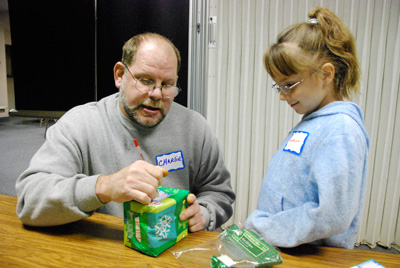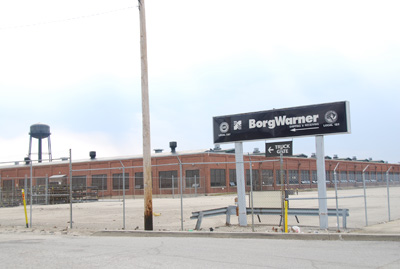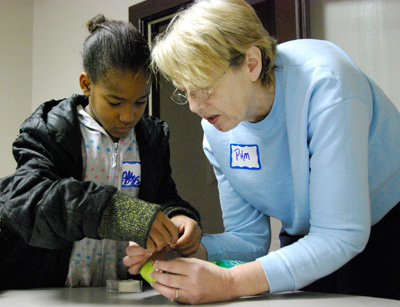Gear Shift

Charlie Saubert helps children wrap donated presents for their parents during a Christmas party at First Baptist Church downtown Muncie.
Photo by Stephen Smith
Charlie Saubert was just five years shy of reaching his dream when the pink slip came.
Saubert had clocked 25 years making auto transmission parts at the Borg Warner plant in Muncie. Another five at the sprawling factory on the outskirts of town and he could have retired. Borg Warner opened its Muncie plant in 1928, and once employed more than a thousand people on four shifts. In recent years, the work force shrunk to a few hundred. Saubert lost his job in June, 2008.
On April 24, 2009 Borg Warner closed the plant for good.
"Sometimes it was hell in there," the 53-year-old says of assembly line work. But hell paid good money and good benefits. And to be honest, the work got easier over the years.

The BorgWarner plant in Muncie closed April 24. At its peak, it employed about 3000 autoworkers, including Charlie Saubert.
Photo by Stephen Smith
"I didn't mind going in there because once I had 30 years in, if I wanted to retire, I could."
Charlie Saubert is a 20th century factory worker trapped in a 21st century knowledge economy. His dream of a comfortable retirement, with hobbies and travel, is at best postponed and possibly demolished. He can't tap his pension until he's 65 unless he takes a much smaller buyout.
Either way, his future has shifted to survival mode.
Saubert and his wife Pam say the years Charlie worked overtime they were "upper middle class." Some years he could work seven days a week and their annual income topped $100,000, a tidy sum anywhere but even more respectable in a small Midwestern town like Muncie. For the first few years of their marriage, Pam had jobs at the local hospital or preparing tax returns. They didn't live extravagantly but they didn't save much either.
The Sauberts are now trying to get by. Pam says there isn't always enough money for groceries. And the bill collectors are harassing them.
"Right now we're living on unemployment," Pam says. "I'm getting bills paid. They may be a month behind, but we're getting bills paid."
The Sauberts are behind on their house payments too. Pam argues with the mortgage company every month. "Look, there's no money coming in," she says to them. She's hung up in tears many times. "All they wanted was their money and I kept trying to tell them there isn't any," she says. The Sauberts plan to use what's left of Charlie's 401K retirement savings to keep from losing their home.

Pam Saubert volunteers with the non-profit group Teamwork for Quality Living. She's pursuing a degree in early childhood education.
Photo by Stephen Smith
Pam manages the family books while going to school full time. She's studying for an associate's degree in early childhood education and hopes to start work on her B.A. at Ball State University in the fall. Their daughter, Samara Saubert, 21, is studying to be a nurse. Samara and her boyfriend live with them, along with a parade of other friends and family who occasionally need a place to stay. Pam says she's not the type to turn away someone in need, no matter how bad it gets for her own family.
Charlie is looking for a job. "I ain't hearing nothing from nobody," Charlie says about his job search. Factory work is scarce right now, and there are plenty of laid-off assembly line workers ready to jump at any opening. "People here are wanting jobs," Pam says. "There's a lot of hard workers. What's gonna hurt is the ones that are older, Charlie's age. All they know is factory work."
He went to the union hall to see about re-training classes, but he didn't follow through after learning he'd have to do high school remedial work. He says school's not for him.
"I just don't have it," Saubert says. "I was lucky to get out of high school."
The Sauberts are focused on getting through this tough period of their lives. They hope Pam will get a job in an elementary school after she graduates in two more years.
They're not thinking about how to repay her student loans or what they'll do for retirement income.
As for Charlie, the days of enforced idleness are long. He does chores around the house and works on his hobby - making hand tooled leather cases and saddlebags. His face lights up when he shows off his leatherwork. He's a man of few words with strangers but the talk flows a bit more freely when it's about his handicraft.
Saubert would like to sell some of his leather goods. But there's not much demand for what he makes in central Indiana. He figures he'd have to head south to horse states like Tennessee and Kentucky. Pam nods approvingly. "We'd like to have a business," she says. She imagines Charlie selling his wares at horse shows and Renaissance Fairs, parlaying an old-fashioned craft into a livelihood.
Given the economic condition of both Muncie and the United States, the search for work will dominate the Saubert's lives for years to come. Even so, an underlying optimism remains. Pam is buoyed by the news that an Italian manufacturer of parts for wind turbines is planning to set up shop in town. More than 400 production jobs are expected by 2012. There's a bit of green energy glowing on Muncie's economic horizon.
"It'll turn around," Pam says hopefully. "It'll get better."
Back to Hard Times in Middletown.

